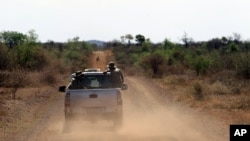Botswana's wildlife authorities say four rhinoceroses were shot, and two of them died, in a heavily guarded sanctuary, although their horns were not removed. The shootings at the sanctuary in central Botswana came after the government de-horned and relocated most of the rhinos further inland to discourage poachers.
The permanent secretary at the environment and tourism ministry, Thato Raphaka, said the shooting took place at the protected Khama Rhino Sanctuary recently.
Raphaka said the two carcasses were found with their horns intact while the other animals were recovering from gunshot wounds.
The motive of the shooting is unknown.
Botswana has been experiencing a poaching crisis since 2018, which has forced authorities to relocate the rhinoceroses from the Okavango Delta, a poaching hot spot.
The majority of the rhino population, estimated at 400 in 2019, was moved to other havens to protect them from poachers.
Following the recent shooting incident, local rhino conservationist Map Ives fears more rhino attacks could be on the way.
“I feel this will not be the last [attack]. These organized criminal syndicates are very determined, and they know that there are gaps in our security, particularly financial gaps, so they will be back for more,” said Ives.
He said it is not clear why the animals were killed, and the horns not removed. He said although the government cannot release too much information on the shooting, there is a need to assure the public about the safety of the rhino sanctuary.
“I appreciate the government’s reluctance to release too much detail. Nonetheless, the Khama Rhino Sanctuary is a public facility into which tourists often travel. So, the presence of armed poachers becomes a security risk for tourism. I would have thought it is necessary to reassure the public as to the whereabouts of where these animals were shot and the period over which they were shot,” said Ives.
More than 200 of Botswana’s rhinos have died since 2018 because of poaching or natural causes, the government reported last month.
The International Rhino Foundation’s executive director, Nina Fascione, said Botswana’s recent reports of rhino killings are concerning.
“The news about more rhinos being poached in Botswana is very distressing. The International Rhino Foundation will continue to work to put a stop to poaching and put security measures to protect rhinos because the current levels of poaching are simply unsustainable for these populations,” said Fascione.
Botswana’s neighbors, Namibia and South Africa, also have been hard hit by rhino poaching. Namibia lost 87 of the animals to poaching in 2022, the highest recorded in a calendar year in that country.
Fascione said there is a need to intensify regional collaboration in the fight against rhino poaching.
“There is an enormous amount of cooperation and collaboration across borders. There are many people working on this. These are global criminal syndicates behind poaching and therefore needs a coordinated global response. The poachers and the product itself; the rhino horn crosses borders, across not only countries but continents. So, it will take law enforcement and others working collaboratively across the globe to get a handle on this,” said Fascione.
The demand for the horn in China and Vietnam fuels poaching with 548 rhinos killed in 2022 across Africa, according to national government and agency figures.





